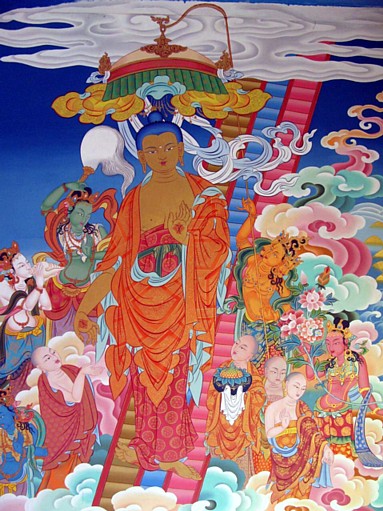Descent from Heaven. From rigpawiki.org
Mayadevi gave birth to the prince Siddhartha Gautama in 563 BCE (other possible dates are 560 BCE, 564 BCE, or 523 BCE). The Vedic gods Indra and Brahma were witnesses to the birth. The presence of these two major gods from the Brahminical pantheon serves as evidence that it was an unpolluted and blessed act. The arrival of the newborn Buddha was hailed by numerous auspicious omens such as pouring rain, which promised a rich harvest and happiness throughout the whole kingdom.
After the birth of the Buddha, Mayadevi returned to the palace, where she was presented with prophecies about the remarkable fate of her child. According to Buddhist legends, she died seven days later. After her death her sister Mahaprajapati and 32 other women were chosen to care for the extraordinary child: eight to carry him, eight to suckle him, eight to bathe him, and the other eight nurses to play with him. Leaving the human world, Mayadevi was carried away to the heaven realm of Trayatrimsa, the heaven of the 33 deities and the fifth heaven in the realm of desire (Skt. kamadhatu). It is located at the top of the cosmic mountain Sumeru. From her new divine perch, she continued to observe her son.
When he almost died as a result of his extreme ascetic practices, Mayadevi descended with her divine retinue near the river Nairanjana, where the bodhisattva was meditating, and cried. Then he convinced her that he would repay his debt for causing her birth pains and she could soon witness his enlightenment. After Prince Siddhartha attained spiritual realization, he visited his mother in Trayatrimsa and expounded the Dharma to her and the other gods in the course of three months.
The Buddha then descended back to the world by means of a heavenly ladder with 33 rungs, accompanied by the gods in a divine procession with flags, conch shells and swirls of celestial fragrances. This moment from the life of the Buddha has become one of the major celebrations in the Tibetan calendar, known as Lha Bab Duchen, or “Festival of the Descent from Heaven,” and is observed on the 22nd day of the ninth Tibetan month of the year.
Shortly before the Paranirvana of the Buddha, Mayadevi descended once again from her heavenly abode, saddened that humanity would be deprived of his guidance. Right before leaving this world, he paid respect to his mother by performing a last ceremony in her honor.
Mayadevi is revered by Buddhists as the divine personification of maternal love, hence also of infinite compassion (Skt. karuna, Tib. nyingje) and immeasurable loving-kindness (Skt. maitri, Tib. jampa). Her divine status secured her a place in the Trayatrimsa heaven, where she dwells in repose, anticipating her next magical manifestation as the mother of the Buddha of the future. It is generally implied that her existence is eternal. But what does eternal mean?
The concept of “eternity” in Buddhism is debatable. We can speak of an eternal or constant flow (Tib. gyun gyi tag pa) only in regard to the Buddha’s sambhogakaya (From Skt. “body of enjoyment”), which is perfect and unchanging. However, his fundamental nature is that of the dharmakaya, the “body of truth,” which exists beyond time and space, beyond the eternal and the passing. Notwithstanding her being mainly associated with Nirmanakaya, the body of the manifested enlightened nature, Mahamaya remains indelible from both Sambhogakaya and Dharmakaya.
Thus Mahamaya is associated both with eternity, despite it not having a true and independent nature, and with the illusory, the realization of which helps one find the absolute truth. Above all, she remains a symbol of the extraordinary power of a mother, without whom no being, and no Buddha, could come into this world alive.

